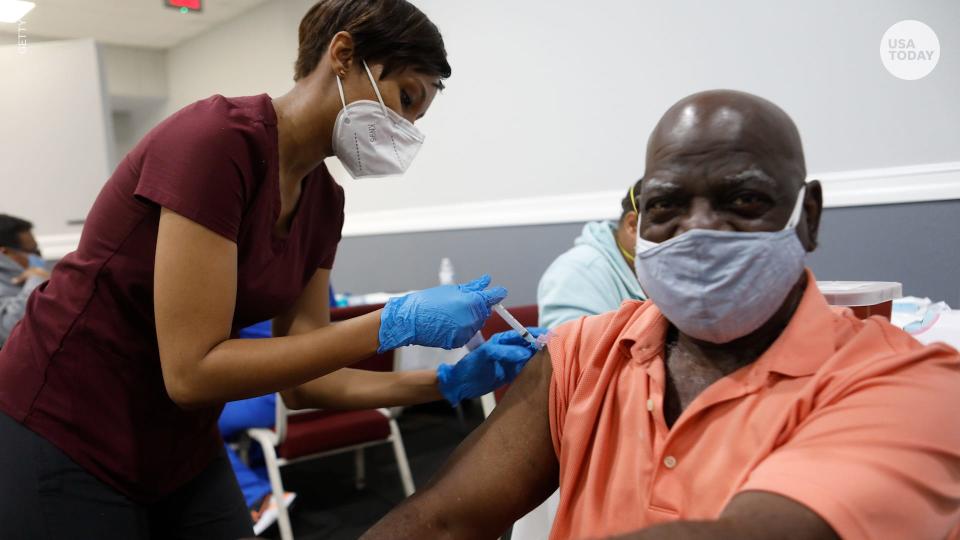Fact check: 6 of the most persistent misconceptions about COVID-19 vaccines
Because of the highly contagious delta variant, some states are seeing their highest number of coronavirus hospitalizations since the pandemic began. Those most at risk: unvaccinated people.
Dr. Rochelle Walensky, director of the Centers for Disease Control and Prevention, said in mid-July that more than 97% of people who had been hospitalized for COVID-19 were unvaccinated. Some vaccinated people have gotten sick, but serious illness is rare in that group – another indication the coronavirus vaccines are safe and effective.
Roughly half of Americans are fully vaccinated against COVID-19, but vaccine hesitancy persists.
More: The delta variant is 'ripping through the unvaccinated' and crowding hospitals in Florida, Texas
About 14% of Americans say they will not get vaccinated, according to the Kaiser Family Foundation. Ten percent say they will wait and see how vaccines work for others, and 3% say they will get vaccinated only if it's required.
There are many reasons some Americans may be hesitant to receive the vaccine – some of which are based on false or misleading information.
USA TODAY has spent months sorting fact from fiction about the coronavirus vaccines. Here are six of the most persistent misconceptions circulating online.
1. The vaccines aren't safe because they were developed quickly
This is missing context. Scientists zeroed in on coronaviruses' spike proteins 20 years ago when looking for a potential vaccine for Severe Acute Respiratory Syndrome (SARS). COVID-19 vaccine research was expedited by updated technology, as well as the decision to launch commercial-scale production before the Food and Drug Administration authorized vaccines for emergency use.
2. Thousands of people have died from the vaccines
This is false. Deaths reported to the Vaccine Adverse Reporting System (VAERS), a database maintained by federal public health agencies, have not been verified. Anyone – from doctors and nurses to parents and patients – can submit suspected vaccine side effects to VAERS. This wide access has led to made-up entries, and federal experts who look into the reports have not found any proof of widespread deaths or serious side effects caused by the vaccines.
3. The vaccines are experimental and weren't tested thoroughly
This is false. All three coronavirus vaccines authorized for emergency use in the USA underwent clinical trials involving tens of thousands of people. The vaccines have also been subject to peer-reviewed studies. All that research has found the vaccines are safe and effective at preventing severe COVID-19 cases.
4. Natural immunity is always stronger than the vaccines
This is partly false. Natural immunity does tend to last longer than immunity acquired from vaccination, but it depends on the pathogen. The tetanus vaccine, for example, provides stronger immunity than the disease itself. Research indicates the COVID-19 vaccines provide more consistent and safer protection than getting sick.

5. The vaccines aren't safe for pregnant women
This is missing context. Clinical trials for the coronavirus vaccines did not include pregnant women, but their exclusion was not atypical. Preliminary research conducted since the trials has found no safety problems associated with pregnant women receiving the vaccines, though experts say more study is needed. Since the coronavirus vaccines do not contain live virus, they are not thought to pose a risk to a growing fetus. It has been recommended that pregnant women get vaccinated against COVID-19, as they are more at risk for severe illness.
6. The vaccines change your DNA
This is false. The Pfizer-BioNTech and Moderna vaccines use messenger RNA (mRNA) technology that teaches the body how to create coronavirus spike proteins, eliciting an immune response. Because synthetic mRNA code is not the same as the DNA found in human cells, it cannot be combined to alter someone's genes. The mRNA breaks down shortly after vaccination and doesn't stay in the body.
Contributing: Miriam Fauzia, Bayliss Wagner, Rick Rouan, Adrienne Dunn, Chiara Vercellone, McKenzie Sadeghi
Thank you for supporting our journalism. You can subscribe to our print edition, ad-free app or electronic newspaper replica here.
Our fact-check work is supported in part by a grant from Facebook.
This article originally appeared on USA TODAY: Fact check: 6 persistent COVID-19 vaccine misconceptions online

 Yahoo Movies
Yahoo Movies 
